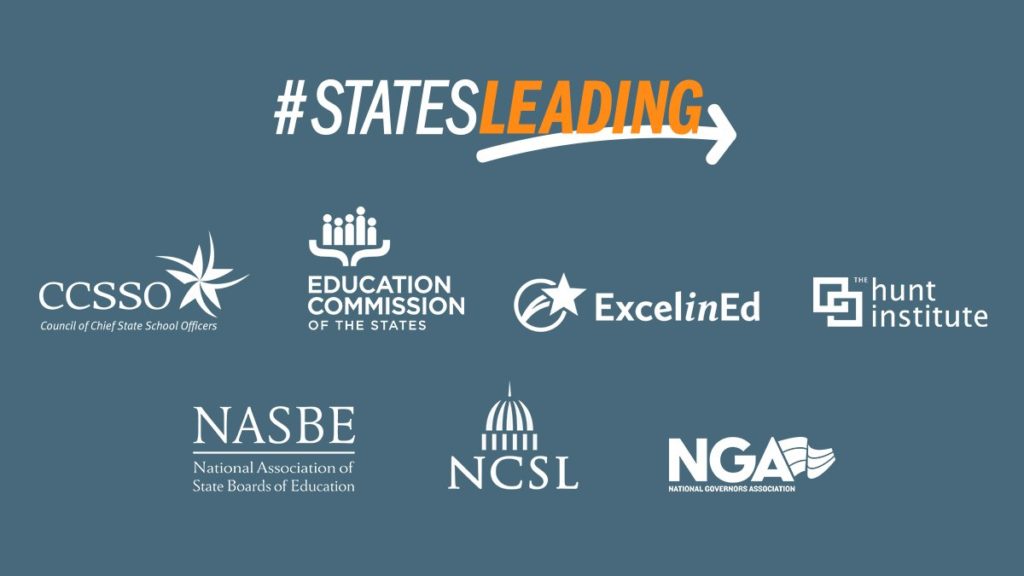The Foundation for Excellence in Education and the Hunt Institute will spotlight best practices and progress to ensure educational equity
Washington, D.C. (July 10, 2018) – The Foundation for Excellence in Education (ExcelinEd) and the Hunt Institute today joined the States Leading campaign, a coalition of organizations working to highlight the progress underway in education across the country. Launched in February, the States Leading campaign showcases how states are pursuing innovative policies and using best practices to best meet the needs of all students.
“At the Foundation for Excellence in Education, we work closely with state policymakers to build student-centered education systems,” said Patricia Levesque, Chief Executive Officer of The Foundation for Excellence in Education. “States are making innovative changes, and their great work deserves to be recognized. That’s what the States Leading campaign is about, and we’re proud to be a part of it.”
With nearly all state ESSA plans approved, states are moving forward with bold initiatives to support educators and close achievement gaps. Beyond ESSA, states are also working together on a range of issues, including early childhood education, teacher and leader preparation, and career readiness, among others. For example, through CCSSO’s Leading for Equity initiative, states are making notable progress toward 10 commitments to create more equitable education systems.
“The States Leading campaign spotlights innovative efforts to improve student outcomes,” said Javaid E. Siddiqi, Ph.D., President and CEO of The Hunt Institute. “We hope that the Hunt Institute’s best practices, research, and insights will inform the policies and decisions being made in states around the country, leading to more successes and better outcomes for students everywhere.”
ExcelinEd and the Hunt Institute join organizations representing America’s leading state education officials, including: the Council of Chief State School Officers (CCSSO), Education Commission of the States (ECS), the National Association of State Boards of Education (NASBE), the National Conference of State Legislatures (NCSL), and the National Governors Association (NGA).
Through a weekly newsletter and social media, the States Leading campaign shares stories of the promising practices and features the innovative policies changing the face of education for our students, teachers, and community. For more information and to sign up for the States Leading newsletter, visit www.statesleading.org. Follow along and join the conversation at #StatesLeading on social media.
###
About the Foundation for Excellence in Education
Launched by former Florida Governor Jeb Bush in 2008, the Foundation for Excellence in Education (ExcelinEd) supports state leaders in transforming education to unlock opportunity and lifelong success for each and every child. From policy development to implementation, ExcelinEd brings deep expertise and experience to customize education solutions for each state’s unique needs. Focused on educational opportunity, innovation and quality, ExcelinEd’s agenda is increasing student learning, advancing equity and readying graduates for college and career.
About the Hunt Institute
An affiliate of the Duke University Sanford School of Public Policy, The Hunt Institute is a recognized leader in the movement to transform public education. Marshaling expertise from a nationwide partner network since it was established in 2001, The Institute brings together people and resources that help build and nurture visionary leadership and mobilize strategic action for greater educational outcomes and student success.
About the Council of Chief State School Officers
The Council of Chief State School Officers (CCSSO) is a nonpartisan, nationwide, nonprofit organization of public officials who head departments of elementary and secondary education in the states, the District of Columbia, the Department of Defense Education Activity, Bureau of Indian Education, and five U.S. extra-state jurisdictions. CCSSO provides leadership, advocacy and technical assistance on major educational issues. The Council seeks member consensus on major educational issues and expresses their views to civic and professional organizations, federal agencies, Congress and the public.
About Education Commission of the States
Education Commission of the States (ECS) serves as a partner to state policymakers by providing personalized support and helping education leaders come together and learn from one another. Through their programs and services, policymakers gain the insight and experience needed to create effective education policy.
About the National Association of State Boards of Education
NASBE is the only national organization giving voice and adding value to the nation’s state boards of education. A nonprofit organization founded in 1958, NASBE works to strengthen state leadership in educational policymaking, promote excellence in the education of all students, advocate equality of access to educational opportunity and ensure continued citizen support for public education.
About the National Conference of State Legislatures
NCSL is a bipartisan organization that serves the legislators and staffs of the states, commonwealths and territories. It provides research, technical assistance and opportunities for policymakers to exchange ideas on the most pressing state issues and is an effective and respected advocate for the interests of the states in the American federal system.
About the National Governors Association
Founded in 1908, the National Governors Association (NGA) is the collective voice of the nation’s governors and one of Washington, D.C.’s most respected public policy organizations. Its members are the governors of the 55 states, territories and commonwealths. NGA provides governors and their senior staff members with services that range from representing states on Capitol Hill and before the Administration on key federal issues to developing and implementing innovative solutions to public policy challenges through the NGA Center for Best Practices. For more information, visit www.nga.org.



